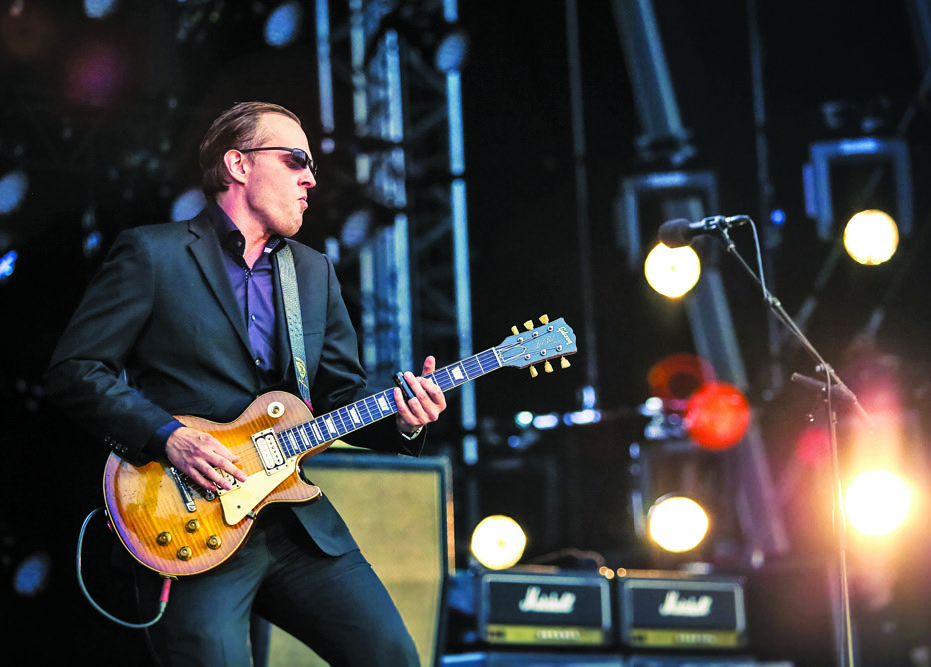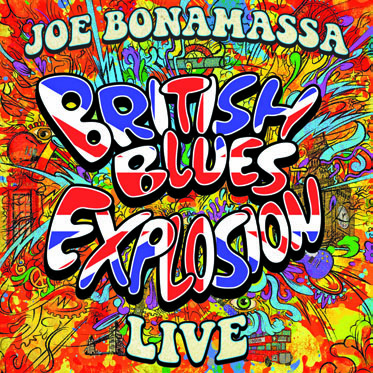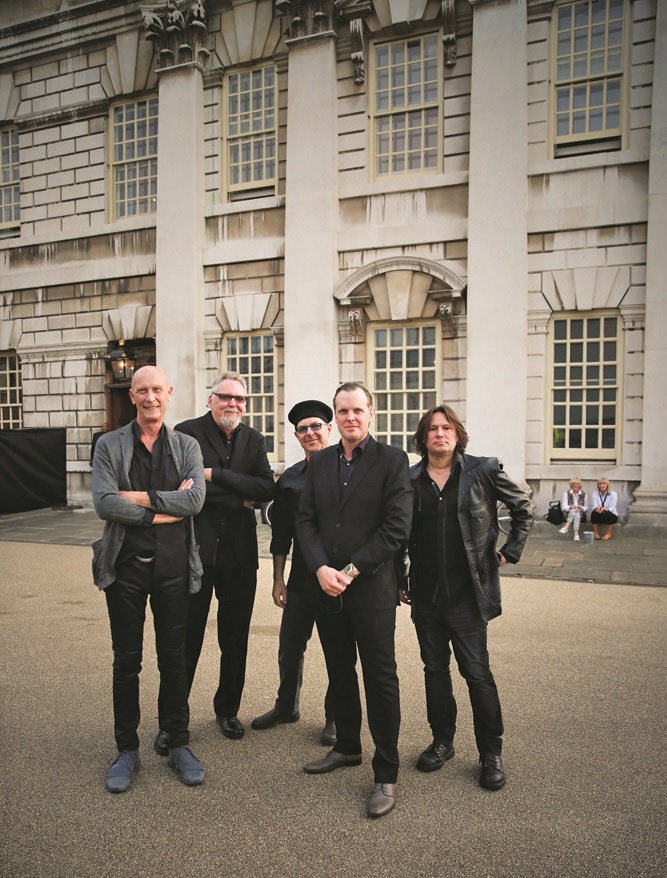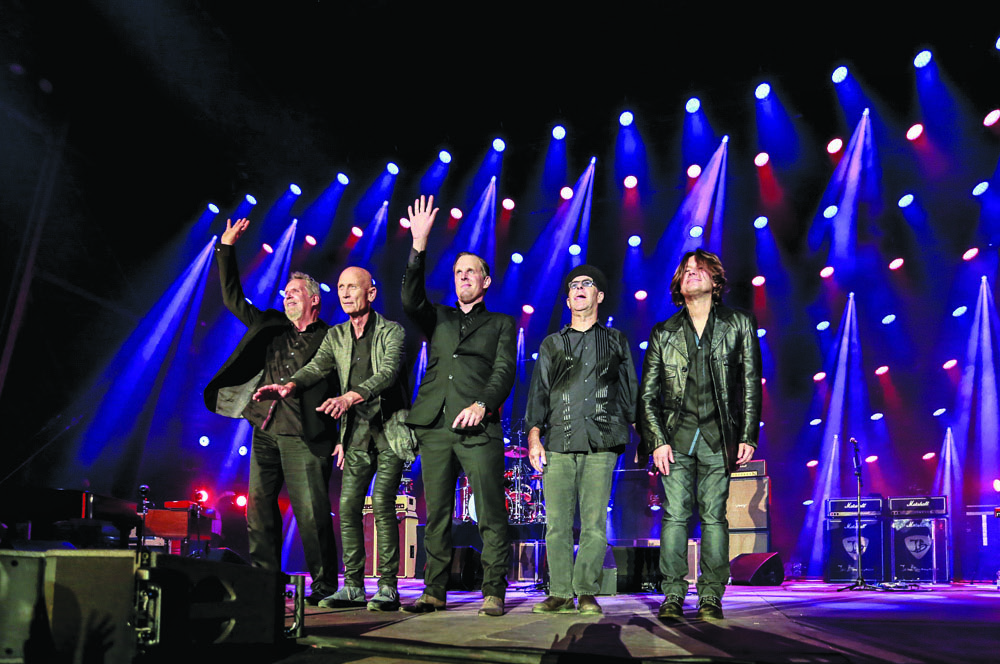Joe Bonamassa Talks 'British Blues Explosion Live,' His New Tribute to Eric Clapton, Jeff Beck and Jimmy Page

Fifty years ago, British guitar gods Eric Clapton, Jeff Beck and Jimmy Page crisscrossed the U.S. with their respective bands, reintroducing Americans to a hip new version of what was essentially their own music—the blues. Two years ago, American blues-rock dynamo Joe Bonamassa did pretty much the same thing—but with an intercontinental twist. He and his band set off on a barnstorming U.K. tour that brought some of the most influential music of Clapton, Beck and Page back home.
Night after sold-out night, Bonamassa opened up the engines, completely blowing the doors off deep cuts like Led Zeppelin’s “Tea for One,” Cream’s “SWLABR” and Jeff Beck’s “Let Me Love You Baby”—even venturing into Seventies and late-Eighties territory with Clapton’s “Motherless Children” and “Pretending.” And while Bonamassa has performed—and even recorded—some of these tunes before, this was the first time he’d ever based an entire tour on the music of this transcendent trio.

“As far as actual playing, Clapton—by far—is my biggest influence, and you can tuck Jeff Beck underneath that,” Bonamassa tells us. “Page would be a distant third, playing wise. But as an arranger, as an interpreter of the blues—even on the straight cover songs Led Zeppelin did—his arrangements, the way he’d take a blues song and say, ‘We’re gonna write an entirely different piece of music around it or take this cadence and put it into something else,’ was brilliant. He’s simply a brilliant arranger and producer of heavy blues rock. It drives home the point that the arrangement is just as critical as the song itself.”
If you happened to miss the all-too-brief tour, you’re in luck. J&R Adventures, Bonamassa’s label, will release British Blues Explosion Live on DVD, Blu-ray, CD and vinyl on May 18. The package captures the band’s particularly powerful July 7, 2016, performance at Greenwich Music Time at the Old Royal Naval College in Greenwich, London.
Bonamassa took some time out from producing Reese Wynans’ solo album (which reunites the keyboardist with his Stevie Ray Vaughan and Double Trouble bandmates, Tommy Shannon and Chris Layton) to talk us through British Blues Explosion Live’s 14 tracks. Incidentally, Wynans’ wizardry can be heard on British Blues Explosion Live, along with guitarist Russ Irwin, bassist Michael Rhodes and drummer Anton Fig.

“Beck’s Bolero”/“Rice Pudding”
Jeff Beck/The Jeff Beck Group
“I’m a self-loathing slide player. Some people like the way I play slide—I hate it. When I hear myself, it sounds like Quint in Jaws when he’s auditioning for the job to kill the shark—fingers on a chalkboard! It’s blood-curdling self-doubt! [laughs] So ‘Beck’s Bolero’ was the biggest challenge of the night. But my introduction to British blues really came through Truth [1968] and Beck-Ola [1969], those two records with Rod Stewart. Those were seminal recordings, and it’s the first time you really hear—at least for me—a Les Paul and a Marshall played in anger. Jeff’s playing has always sounded angry to me. That’s when I realized the guitar could be a weapon as well—and it’s pretty fun.”
All the latest guitar news, interviews, lessons, reviews, deals and more, direct to your inbox!
“Mainline Florida”
Eric Clapton
“This is one of Clapton’s more overlooked records, from 461 Ocean Boulevard [1974]. He had this kind of honky-tonk, Southern rock influence in the Seventies. Songs like ‘Wonderful Tonight’ outshine a lot of that era’s catalog. Anyway, this one fits our band really well, with Russ Irwin playing the role of George Terry [guitarist in Clapton’s mid-Seventies band]. We were trying to harken back to a forgotten jewel from a period that’s bookended by Derek and the Dominos and his Eighties stuff, which gets a lot more attention. I can’t speak for Eric, but it’s from a time when he was searching for something different. He didn’t want to be Eric Clapton. He was looking for something that was in a different lane.”
“Boogie with Stu”
Led Zeppelin
“I call this song a musical sorbet. It’s simple and bone-headed and people dance to it! When people are tired of sludging through blues rock with a lot of information, you serve them a sorbet. I didn’t realize until recently that this is actually a Ritchie Valens song called ‘Ooh, My Head.’ If you look at the writing credits on Physical Graffiti [1975], Zeppelin had to go back retroactively and credit ‘Mrs. Valens,’ Ritchie’s widow.”
“Let Me Love You Baby”
Jeff Beck
“Another one from Truth. It is treacherous territory to try to sing like Rod Stewart in those ranges, and I had to put up or shut up. I was proud of the version we ended up doing, but it was by far the most challenging song to sing. It’s the second song on Truth, and once I heard that Les Paul sound and that swagger and Rod Stewart, I said, ‘This is what I want to do for a living.’ It’s always been one of my favorites.”
“Plynth (Water Down the Drain)”
The Jeff Beck Group
“This one, from Beck-Ola, isn’t much of a song, but it’s one of the heaviest riffs I’ve ever heard. This is just one man’s opinion, but the heaviest riffs I’ve ever heard on electric guitar were done in standard tuning. They weren’t down-tuned—they just burned bright and red. I think this song is in the key of G. You know, it’s the same thing with ‘Smoke on the Water,’ and I think [Deep Purple’s] ‘Mistreated’ is in F#. They were standard-tuned guitars—but the riffs are heavier. I’d put this riff up there with early Black Sabbath.”
“Spanish Boots”
The Jeff Beck Group
“Beck-Ola is a weird album. I think it’s got two Elvis covers, an instrumental piano record… It seemed like it was, ‘Well, we’ve gotta do another record for Epic, fine. It is what it is.’ But, to me, ‘Spanish Boots’ always showcased Ronnie Wood’s bass playing; he’s an incredibly underrated bass player, especially in those days. He was so forward thinking and he had that distorted bass.”
“Double Crossing Time”
John Mayall & The Bluesbreakers
“This one’s from the ‘Beano’ album [1966’s Blues Breakers with Eric Clapton]. I always loved Clapton’s solo on this one, and again, you’re seeing the DNA and the beginnings of my love affair with the Les Paul. You just think, That guitar is capable of this sound. I’ve just got to go find it and chisel it out.”
“Motherless Children”
Eric Clapton
“Another one from 461 Ocean Boulevard. Reese Wynans, our keyboard player, says, ‘Man, that’s a morbid lyric for such a happy song.’ The music is all happy, and the refrain is, ‘and your mother is dead now, your mother is dead.’ We tried to concentrate on the more up-tempo stuff for this DVD, and this one always went over well. This is one of my favorite Clapton riffs; the head that he came up with is really catchy. Instead of doing the slide, I did it in standard tuning. I wanted the intonation to be right, and I didn’t want my shitty slide playing to come into play where I couldn’t listen to it or be proud of it.”
“SWLABR”
Cream
“Ah, yes, ‘She Walks Like a Bearded Rainbow’ from Disraeli Gears [1967]. I just saw Pete Brown, who co-wrote this song with Cream’s Jack Bruce. He and I were gonna write together for my next album. I said, ‘Pete, I want some of that wacky shit you’ve got laying around from the Sixties and Seventies. “She Walks Like a Bearded Rainbow”? I’m all about it! Let’s do it!’ You have to have a moment of Zen or meditation somewhere in Katmandu or basecamp at Mount Everest to figure out what they were smoking, imbibing or talking about during that time. But it’s a fun song.”
“Tea for One”/“I Can’t Quit You Baby”
Led Zeppelin
“One of the first songs I did with producer Kevin Shirley is ‘Tea for One’ [from 2006’s You & Me]. And it wasn’t me singing; it was a guy named Doug Henthorn. I’m not that kind of vocalist. I’m a shouting singer more than that kind of sustained croon. For the tour, we wanted to do ‘Tea for One’ in some capacity, but I said I really don’t want to sing it. Why don’t we do a mashup? We’ll put the top end of ‘Tea for One’ onto ‘I Can’t Quit You Baby’ [from 1969’s Led Zeppelin] and I can sing it with pride. People love that minor slow blues. It was definitely one of my favorites of the night to play.”
“Little Girl”
John Mayall & The Bluesbreakers
“John Mayall doesn’t get enough credit. He’s not in the Rock and Roll Hall of Fame, which is a tragedy. He’s 84 and he’s still vibrant. I just played on his record. There’s not a guy who loves the blues and loves guitar players as much as John Mayall, even to this day. And you can hear it on his recordings, the unbridled enthusiasm. I just love the way they did it back in those days. The guitar solo is really composed, but it still feels loose. Clapton at that point, post Yardbirds, had something to prove. He was aiming straight at the bullseye and wasn’t taking any prisoners. You can tell how much pride he took in all of the solos on [Blues Breakers with Eric Clapton]. There’s not a throwaway guitar solo on the record.”

“Pretending”
Eric Clapton
“A selfish choice by me. I’ve always liked this song, and it really went over well. I love Clapton’s Eighties era, the Journeyman days [1989]. He’s a rock star! Where do you think I nicked the idea to wear the suits? It didn’t come from my mother. [laughs] But I always loved his tone and his approach on this one. I think Russ Titelman produced that record. It’s just a good groove and a good song.”
“Black Winter”/“Django”
Joe Bonamassa
“We wanted to do [the Yardbirds’] ‘White Summer,’ or a take on it. But how do you cover some stream-of-consciousness riff in DADGAD tuning? So, we came up with this idea. None of us take drugs, but why don’t we just get in the spirit of it and then bookend it with our instrumental, ‘Django’ [from You & Me]? Again, it’s that musical sorbet, that cool moment in the show before the finale. The night we did it on the DVD was by far my best attempt. There was just something going on. Usually, when we cut DVDs, everybody collectively goes, ‘Ah, shit, the night before was better.’ But that particular night, I hit all the marks I wanted to hit.”
“How Many More Times”
Led Zeppelin
“My favorite Led Zeppelin song of all time. Well, it’s a tie with ‘The Rain Song.’ ‘How Many More Times’ closes out Led Zeppelin, and when you hear it, you just think, that is the sound of a band blowing the roof off the joint. We still play this song in our show to this day as our closer. It goes over that well.”

Damian is Editor-in-Chief of Guitar World magazine. In past lives, he was GW’s managing editor and online managing editor. He's written liner notes for major-label releases, including Stevie Ray Vaughan's 'The Complete Epic Recordings Collection' (Sony Legacy) and has interviewed everyone from Yngwie Malmsteen to Kevin Bacon (with a few memorable Eric Clapton chats thrown into the mix). Damian, a former member of Brooklyn's The Gas House Gorillas, was the sole guitarist in Mister Neutron, a trio that toured the U.S. and released three albums. He now plays in two NYC-area bands.
